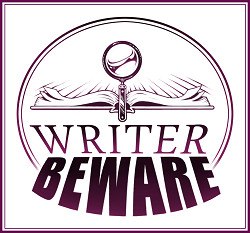OVERVIEW AND SITE MAP
What You’ll Find on This Website
There are sharks in the literary waters. Deceptions abound, from fee-charging literary agents, to dishonest freelance editors, to predatory vanity publishers, to fake contests, to imposter scams, to ripoff schemes targeted at self-published authors.
Add to that the complications of copyright, the plethora of dubious writers’ services, and the hordes of well-intentioned but unqualified agents, publishers, editors, and marketers, and you have a veritable minefield of literary pitfalls just waiting for the unwary writer, whether a beginner or a seasoned pro, whether you’re pursuing the traditional publishing route or working to self-publish.
The good news: if you know the warning signs, it’s completely possible to protect yourself. At the Writer Beware website, you’ll find a full toolkit to help you: detailed discussions of questionable practice, information on how to identify it, advice on how to avoid it, and links to useful online resources.
Here’s a summary (in alphabetical order) of what you’ll find on Writer Beware.
- About Writer Beware: Who are we? What do we do? Why do we do it? Get the answers here, including how to get in touch with us.
- Case Studies: In-depth looks at how a number of (mostly) defunct literary scams operated.
- Contests and Awards: Some literary contests and awards are prestigious, but many aren’t. Worse, they may be money-making schemes, or fronts for fee-charging agencies or publishers. On this page you’ll find tips to help you assess a contest’s or an award’s legitimacy, as well as some thoughts on an important question: Is entering worth it?
- Copyright: Misconceptions and myths surround the complex subject of copyright, including the belief that you must register your copyright in order to be protected (not true–your work is protected from the moment you write down the words), or that you must include copyright notices on unpublished work submitted to agents and publishers (also not true, and liable to produce a bad impression). The Copyright page provides general information on copyright–including why it’s not necessary to register copyright for unpublished book-length work–and punctures some common copyright myths.
- Editors and Editing: Self-editing is a vital part of the writer’s craft, but there are also situations in which it may make sense to hire an independent editor. There are many excellent editors and editing services; unfortunately, there are also many questionable ones, with dubious qualifications, inflated fees, and deceptive come-0ns. This page covers the warning signs, and provides tips on how to choose qualified service providers. There’s also a discussion of the limitations of editing, and why you should consider carefully before choosing this often very expensive option.
- Legal Recourse and Other Remedies: This section provides advice on taking legal action if you believe you’ve been defrauded. It also suggests a variety of avenues for filing complaints about dishonest or fraudulent practice.
- Literary Agents: A good literary agent can be a tremendous boon to a writer’s career. But there are also many disreputable agents who prey on writers by charging fees, promoting their own paid editing services, engaging in kickback referral schemes, and misrepresenting their knowledge and expertise. Equally dangerous are the many amateur and incompetent agents, who lack the skills and knowledge to successfully market manuscripts to publishers; and the unscrupulous scammers who impersonate literary agents in order to extract money from writers. The Literary Agents page discusses questionable agenting practices, offers tips on how to identify and avoid fraudulent and amateur agents, and provides links to help you research agents’ reputations.
- Self-Publishing: A growing array of self-publishing options have made it possible for anyone to publish a book, free of charge or at a cost considerably lower than the old-style vanity publishers. It’s a competitive field, however, with many challenges–in particular, achieving visibility in this increasingly crowded publishing segment. Plus, the rise of self-publishing has driven a corresponding explosion of schemes and scams aimed at self-publishers. The Self-Publishing page takes an in-depth look at all these issues, and provides tips and links to help you find and evaluate appropriate options.
- Small Presses: Digital technology makes it easy and inexpensive to set up a publishing operation, and has spurred huge growth in the number of small presses over the past couple of decades. But though there are many wonderful small presses, there are also many less desirable ones, including vanity publishers in disguise. The Small Presses page discusses these problems and the dangers they pose to writers, along with the warning signs of scams, advice on how to judge a publisher’s professionalism, and links to helpful resources.
- Vanity Anthologies: Vanity anthology companies turn their contributors into customers, either by charging a fee for inclusion or pressuring contributors to buy multiple copies. They often entice writers with free contests in which most or all entrants are declared finalists. The Vanity Anthologies page exposes how these deceptive schemes work.
- Vanity and Hybrid Publishers: Some vanity publishers are honest and straightforward. Many aren’t, concealing their fees, breaking contract terms, and otherwise defrauding writers. On this page, you’ll learn the warning signs of a dishonest vanity publisher, as well as the pros and cons of the new “hybrids”–publishers that charge hefty fees but offer services equivalent to those of traditional publishers.
- Writers’ Services: The past few years have seen an extraordinary increase in the number of people writing and trying to publish books. In addition to fueling an astounding proliferation of scams and schemes, this has also spawned a variety of services targeted to writers. Some are frauds; a few are genuinely intended to help. Many are just a waste of money. This page discusses common writers’ services and their usefulness (or lack of it).
Except for graphics, and where specifically indicated, all Writer Beware® contents copyright © Victoria Strauss
MAY NOT BE REPRODUCED WITHOUT PERMISSION

